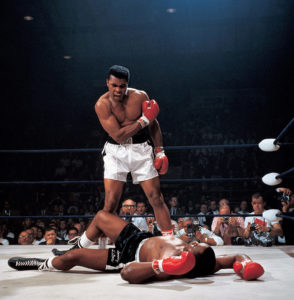 It was the penultimate rivalry in boxing in the decade of the 60’s. Motormouthed Olympic champion Cassius Clay vs. quiet Sonny Liston.
It was the penultimate rivalry in boxing in the decade of the 60’s. Motormouthed Olympic champion Cassius Clay vs. quiet Sonny Liston.
Clay had won gold in the 1960 Games at Rome. Liston had become the heavyweight champ by Knocking Floyd Patterson out in the first round in 1962. The next year, he did it again. In the first round.
Liston was sort of an “preincarnation” of Mike Tyson. He had been arrested some nineteen times, was illiterate, and distinctly antisocial. Raised in abject poverty in Forrest City, Arkansas (named after the founder of the Ku Klux Klan), he ended up relocating as a teenager with his mother to St. Louis, where he had his first run-in with the law. Armed robbery.
He was later incarcerated for breaking a police officer’s knee and stealing his gun. In 1960, while Clay was winning gold, Liston was testifying before Congress in a probe of organized crime’s alleged control of professional boxing.
Liston had been widely rumored to have gotten himself involved with the mafia. It seemed a natural fit for a young man who had long been turning to illegal means to solve his problems.
In the first fight with Clay, Liston refused to come out for the seventh round. The world was outraged. The cries of fix were quick off the typewriters of sportswriters, and the tongues of commentators. It was widely assumed that Liston had taken a dive.
A second fight should put the matter to rest, or so boxing authorities thought. A match was arranged for Boston in 1964. Ali’s needing surgery to repair a hernia delayed the bout. Then late in the game, it was discovered that the promoters didn’t have a license to fight in Massachusetts. A May 25, 1965 match was quickly scheduled for Lewiston, Maine, in a small auditorium.
Is this starting to sound strange yet? Hold on, there’s more.
A tiny crowd of less than 2500 fans (think a high school football game) watched Liston hit the canvas in the first round. What they DIDN’T see was the punch that landed the knockout.
TV replays of “the phantom punch” seem to confirm that Liston wanted no part of defeating Clay, for whatever reason. Palindromically named Sports Illustrated writer Mark Kram claimed that Liston told him years later “That guy [Clay] was crazy. I didn’t want anything to do with him. And the [Black] Muslims were coming up. Who needed that? So I went down. I wasn’t hit.”
What really happened? We’ll likely never know. But Clay, later Muhammad Ali, was one of the greatest of heavyweight champs. He was certainly capable of beating Liston on even terms. But whether or not he actually did so will be fodder for debate for many years.